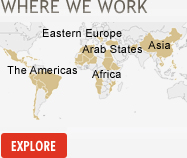

Millennium Development Goals
The Millennium Development Goals (MDGs) are eight goals with measurable targets and clear deadlines for improving the lives of the world's poorest people. To meet these goals and eradicate poverty, leaders of 189 countries signed the historic millennium declaration at the United Nations Millennium Summit in 2000. At that time, eight goals that range from providing universal primary education to avoiding child and maternal mortality were set with a target achievement date of 2015.
The MDG-F contributed directly and indirectly to the achievement of the Millennium Development Goals, with the main driver behind its work being the eradication of extreme poverty. The Fund adopted an inclusive and comprehensive approach to the MDGs, embracing the discourse on climate change as it relates to poverty while incorporating other programme areas that are recognized as prerequisites and/or mechanisms for MDG achievement. Our approach was guided by the Millennium Declaration and its emphasis on development as a right, with targeted attention directed towards traditionally marginalized groups such as ethnic minorities, indigenous groups and women.
As the table below illustrates, six out of the eight MDG-F programmatic areas addressed one or more of the MDGs and their respective targets, while the last two played an important contributing role.
| MDG-F Programme Area | Millennium Development Goal | MDG Targets |
|---|---|---|
| Environment and Climate Change | GOAL 7: Ensure Environmental Sustainability |
MDG Targets 7a: Integrate the principles of sustainable development into country policies and programmes; reverse loss of environmental resources. |
| Children, Food Security and Nutrition | GOAL 4: Reduce Child Mortality GOAL 1: Eradicate Extreme Poverty and Hunger |
MDG Targets 4a: Reduce by two thirds, between 1990 and 2015, the mortality rate among children under five. |
| Gender Equality and Women's Empowerment | GOAL 3: Promote Gender Equality and Empower Women |
*The target for this Goal is limited to gender parity in primary and secondary education. MDG-F took a wider approach, addressing gender equality and women’s empowerment as a requirement for the fulfillment of all the MDGs. |
| Youth, Employment and Migration | GOAL 1: Eradicate Extreme Poverty and Hunger |
MDG Targets 1b: Achieve full and productive employment and decent work for all, including women and young people. |
| Democratic Economic Governance | GOAL 7: Ensure Environmental Sustainability |
MDG Targets 7.C: Halve by 2015 the proportion of people without sustainable access to safe drinking water. |
| Development and the Private Sector | GOAL 1: Eradicate Extreme Poverty and Hunger |
MDG Targets 1.A: Halve, between 1990 and 2015, the proportion of people whose income is less than $1.00 a day. |
| Culture and Development | GOAL 1: Eradicate Extreme Poverty and Hunger GOAL 3: Promote Gender Equality and Empower Women |
MDG Targets 1.A: Halve, between 1990 and 2015, the proportion of people whose income is less than $1.00 a day. *This area focused on cultural rights, social inclusion and its potential in stimulating creative industries. |
| Conflict Prevention and Peacebuilding | GOAL 1: Eradicate Extreme Poverty and Hunger GOAL 3: Promote Gender Equality and Empower Women |
*Addressed as a cause and symptom of poverty and a condition for MDG fulfillment. *15% of the budget in this area was directed towards gender related interventions. |


